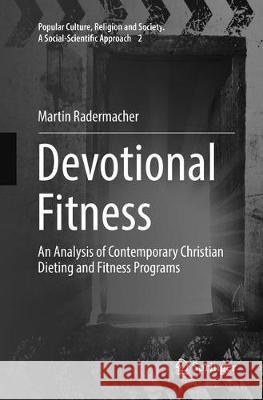Devotional Fitness: An Analysis of Contemporary Christian Dieting and Fitness Programs » książka
topmenu
Devotional Fitness: An Analysis of Contemporary Christian Dieting and Fitness Programs
ISBN-13: 9783319842479 / Angielski / Miękka / 2018 / 275 str.
Kategorie:
Kategorie BISAC:
Wydawca:
Springer
Seria wydawnicza:
Język:
Angielski
ISBN-13:
9783319842479
Rok wydania:
2018
Wydanie:
Softcover Repri
Ilość stron:
275
Waga:
0.41 kg
Wymiary:
23.39 x 15.6 x 1.52
Oprawa:
Miękka
Wolumenów:
01
Dodatkowe informacje:
Wydanie ilustrowane











